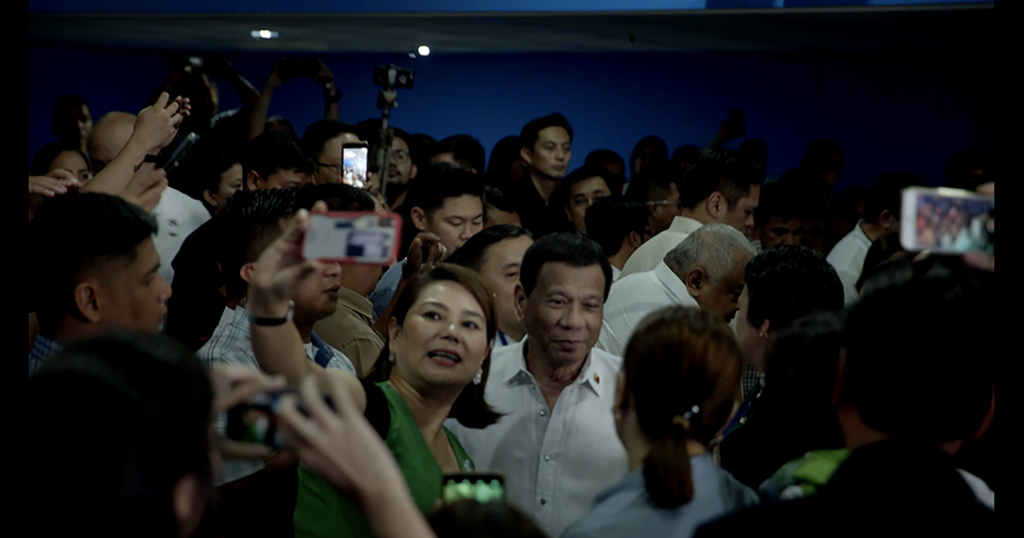January 11, 2021
by Carla Hay
With two prizes, including Best Feature, “Nomadland” was the top winner at 2020 IFP Gotham Awards. The winners were announced in New York City on January 11, 2021. “Nomadland,” a drama directed by Chloé Zhao and starring Frances McDormand as a widow who lives out of her van, also received the Gotham Audience Award, which is voted on by IFP members. On January 6, 2021, it was announced that Independent Filmmaker Project (IFP) is renaming itself the Gotham Film & Media Institute, also known as The Gotham.
Best Actress went to Nicole Beharie of “Miss Juneteenth,” while Best Actor went to Riz Ahmed of “Sound of Metal.” Breakthrough Actor (a category for people of any gender) was awarded to “One Night in Miami…” actor Kingsley Ben-Adir, who portrays Malcolm X in the movie.
There were two categories that resulted in ties in winners: Best Documentary was awarded to director Ramona S. Diaz’s “A Thousand Cuts” (about Filipina journalist Maria Ressa’s battles with government backlash in the Philippines) and director Garrett Bradley’s “Time,” a movie spanning decades about Louisiana woman Fox Rich’s quest to get her husband released from prison. The Best Screenplay award also resulted in two winners: Radha Blank’s “The Forty-Year-Old Version” (a comedy about a female playwright who decides to become a rapper at 40 years old) and Dan Sallitt’s “Fourteen,” a comedy about a mentally ill woman.
This was the first Gotham Awards show to have TV categories. The winners were both from HBO: the superhero drama “Watchmen” for Breakthrough Series – Long Format and the #MeToo drama “I May Destroy You” for Breakthrough Series – Short Format.
In non-competitive categories, the Film Tribute Award went to actress Viola Davis, actor Chadwick Boseman, filmmaker Steve McQueen and the Netflix drama “The Trial of the Chicago 7.” “Westworld” actor Jeffrey Wright received the Made in New York award, which is given to entertainers who were raised in New York City or have strong ties to New York.
The Western drama “First Cow” went into the ceremony with the most nominations (four), but ended up not winning any IFP Gotham Awards.
Here is the complete list of nominees and winners of the 2020 IFP Gotham Awards:
*=winner
Best Feature
The Assistant
Kitty Green, director; Kitty Green, Scott Macaulay, James Schamus, P. Jennifer Dana, Ross Jacobson, producers (Bleecker Street)
First Cow
Kelly Reichardt, director; Neil Kopp, Vincent Savino, Anish Savjani, producers (A24)
Never Rarely Sometimes Always
Eliza Hittman, director; Adele Romanski, Sara Murphy, producers (Focus Features)
Nomadland*
Chloé Zhao, director; Frances McDormand, Peter Spears, Mollye Asher, Dan Janvey, Chloé Zhao, producers (Searchlight Pictures)
Relic
Natalie Erika James, director; Anna Mcleish, Sarah Shaw, Jake Gyllenhaal, Riva Marker, producers (IFC Midnight)
Best Documentary
76 Days
Hao Wu, Weixi Chen, Anonymous, directors; Hao Wu, Jean Tsien, producers (MTV Documentary Films)
City Hall
Frederick Wiseman, director; Frederick Wiseman, Karen Konicek, producers (Zipporah Films)
Our Time Machine
Yang Sun, S. Leo Chiang directors; S. Leo Chiang, Yang Sun, producers (Passion River Films)
A Thousand Cuts* (tie)
Ramona S. Diaz, director; Ramona S. Diaz, Leah Marino, Julie Goldman, Christopher Clements, Carolyn Hepburn, producers (PBS Distribution | FRONTLINE )
Time* (tie)
Garrett Bradley, director; Lauren Domino, Kellen Quinn, Garrett Bradley, producers (Amazon Studios)
Best International Feature
Bacurau
Kleber Mendonça Filho, Juliano Dornelles, directors; Emilie Lesclaux, Saïd Ben Saïd, Michel Merkt, producers (Kino Lorber)
Beanpole
Kantemir Balagov, director; Alexander Rodnyansky, Sergey Melkumov, producers (Kino Lorber)
Cuties (Mignonnes)
Maïmouna Doucouré, director; Zangro, producer (Netflix)
Identifying Features*
Fernanda Valadez, director; Astrid Rondero, producer (Kino Lorber)
Martin Eden
Pietro Marcello, director; Pietro Marcello, Beppe Caschetto, Thomas Ordonneau, Michael Weber, Viola Fügen, producers (Kino Lorber)
Wolfwalkers
Tomm Moore, Ross Stewart, directors; Paul Young, Nora Twomey, Tomm Moore, Stéphan Roelants, producers (Apple)
Bingham Ray Breakthrough Director Award
Radha Blank for The Forty-Year-Old Version (Netflix)
Channing Godfrey Peoples for Miss Juneteenth (Vertical Entertainment)
Alex Thompson for Saint Frances (Oscilloscope Laboratories)
Carlo Mirabella-Davis for Swallow (IFC Films)
Andrew Patterson for The Vast of Night (Amazon Studios)*
Best Screenplay
Bad Education, Mike Makowsky (HBO)
First Cow, Jon Raymond, Kelly Reichardt (A24)
The Forty-Year-Old Version, Radha Blank (Netflix)*
Fourteen, Dan Sallitt (Grasshopper Film)*
The Vast of Night, James Montague, Craig Sanger (Amazon Studios)
Best Actor
Riz Ahmed in Sound of Metal (Amazon Studios)*
Chadwick Boseman in Ma Rainey’s Black Bottom (Netflix)
Jude Law in The Nest (IFC Films)
John Magaro in First Cow (A24)
Jesse Plemons in I’m Thinking of Ending Things (Netflix)
Best Actress
Nicole Beharie in Miss Juneteenth (Vertical Entertainment)*
Jessie Buckley in I’m Thinking of Ending Things (Netflix)
Yuh-Jung Youn in Minari (A24)
Carrie Coon in The Nest (IFC Films)
Frances McDormand in Nomadland (Searchlight Pictures)
Breakthrough Actor
Jasmine Batchelor in The Surrogate (Monument Releasing)
Kingsley Ben-Adir in One Night in Miami… (Amazon Studios)*
Sidney Flanigan in Never Rarely Sometimes Always (Focus Features)
Orion Lee in First Cow (A24)
Kelly O’Sullivan in Saint Frances (Oscilloscope Laboratories)
Breakthrough Series – Long Format (over 40 minutes)
The Great, Tony McNamara, creator; Tony McNamara, Marian Macgowan, Mark Winemaker, Elle Fanning, Brittany Kahan Ward, Doug Mankoff, Andrew Spaulding, Josh Kesselman, Ron West, Matt Shakman, executive producers (Hulu)
Immigration Nation, Christina Clusiau, Shaul Schwarz, Dan Cogan, Jenny Raskin, Brandon Hill, Christian Thompson, executive producers (Netflix)
P-Valley, Katori Hall, creator; Katori Hall, Dante Di Loreto, Peter Chernin, Jenno Topping, Liz W. Garcia, executive producers (STARZ)
Unorthodox, Anna Winger, Alexa Karolinski , creators; Anna Winger, Henning Kamm, executive producers (Netflix)
Watchmen, Damon Lindelof, Creator for Television; Tom Spezialy , Nicole Kassell , Stephen Williams, Joseph E. Iberti, executive producers (HBO)*
Breakthrough Series – Short Format (under 40 minutes)
Betty, Crystal Moselle, Lesley Arfin, Igor Srubshchik, Jason Weinberg, executive producers (HBO)
Dave, Dave Burd, Jeff Schaffer, creators; Dave Burd, Jeff Schaffer, Saladin K. Patterson, Greg Mottola, Kevin Hart, Marty Bowen, Scooter Braun, Mike Hertz, Scott Manson, James Shin, executive producers (FX Networks)
I May Destroy You, Michaela Coel, creator; Michaela Coel, Phil Clarke, Roberto Troni, executive producers (HBO)*
Taste the Nation, Padma Lakshmi, David Shadrack Smith, Sarina Roma, executive producers (Hulu)
Work in Progress, Abby McEnany, Tim Mason, creators, Abby McEnany, Tim Mason, Lilly Wachowski, Lawrence Mattis, Josh Adler, Ashley Berns, Julia Sweeney, Tony Hernandez, executive producers (SHOWTIME)


